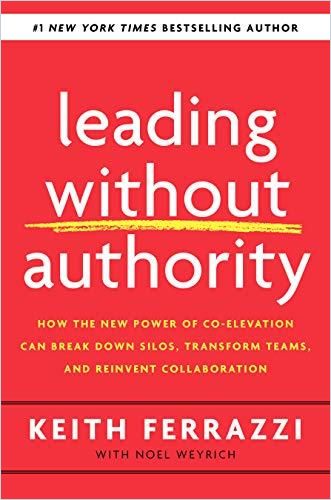Be a leader – even if that’s not in your job title. Keith Ferrazzi explains his new concept – “co-elevation” – and how managers can use it to inspire collaboration.

Good Managers Elevate All Employees
The New York Times best-selling author of Who’s Got Your Back and Never Eat Alone, Keith Ferrazzi is founder and CEO of Ferrazzi Greenlight. His thesis is that, contrary to popular belief, you don’t need a title or a lofty position to be a leader at work. All you need, he insists, is the desire to build fruitful relationships and create an open, honest and productive culture. Ferrazzi lays out a blueprint for transforming your relationships and your business. He reveals how to use “co-elevation” to enlist your colleagues in a shared mission of individual and collective growth. Along the way, Ferrazzi explains, you’ll learn humility, gratitude and generosity.
A broad range of businesspeople and authors have praised Ferrazzi’s ideas. For example, Peter Guber, co-owner of the Golden States Warriors and the Los Angeles Dodgers, called this, “A brilliant, unique approach to building relationship capital by creating trusting and lasting human connection, not merely digital contact – inside and outside your company.” Dave Asprey, author of The Bulletproof Diet, found this to be, “A masterful guide to thriving in today’s very weird workplace.”
Co-Elevation
Ferrazzi leads with a point most business authors make today: Leadership derived solely from position or title no longer functions in an era of unprecedented innovation and disruption. He offers the term “co-elevation” – a means of revamping workplace collaboration – to break through gridlocks that stifle progress and fuel frustration. The author explains that co-elevation calls for forming teams that commit to mutual respect, accountability and transparency.
The relentless pressure to innovate demands co-elevation, because opportunities arise too fast to be dealt with any other way. Keith Ferrazzi
Though this idea is not new, Ferrazzi insists that co-elevation addresses people’s intrinsic need to belong and pursue a common objective.
Co-Elevation Partners
Ferrazzi tells managers that they must treat new members of their group with the same devotion, kindness and concern they show their direct reports. This, of course, presumes managers already treat their employees that way.
The author stresses that collaboration and co-elevation are a manager’s responsibility. He raises the crucial truth that sometimes you must collaborate with people whose work styles or personalities clash with yours. He insists that those relationships will improve only if you’re proactive. Ferrazzi underscores that you can’t co-elevate by yourself.
Ferrazzi also urges you to speak up if you see injustice, unfairness or unprofessional conduct. While noble, this idea doesn’t exactly align with the rest of the book, and it feels like a bit of a nod to current mores.
Generosity and Service
Shifting from business advice to self-help, Ferrazzi tells you to adopt generosity as your guiding principle. In every interaction, he advises, ask what you can do to make the other person’s life happier, richer and more productive. Within this framework, he recommends considering each individual’s ability to cope with new ideas and change his or her behaviors.
The author, echoing many current management books, maintains that career growth and collaboration can’t exist without transparency. He warns that conflict avoidance often is a major hindrance to collaboration. His common-wisdom recommendation is to try to create a secure, non-threatening environment that encourages participation and constructive feedback.
Partnership
Co-development, Ferrazzi reminds you, means peers engage in honest feedback to elevate individual and group performance.
Remember, even if we are leading the team, we are never above anyone on the team. Keith Ferrazzi
When you commit to leading without authority, Ferrazzi teaches, you are obliged to extend a hand to struggling teammates.
Praise and Celebration
Ferrazzi offers praising and celebrating as powerful tools. Validation doesn’t cost you a penny, he says, yet it yields payback in productivity, engagement, trust and retention of top talent.
You can earn permission to co-elevate with someone fairly quickly once you identify their emotional purpose. Keith Ferrazzi
Ferrazzi identifies inspiring your teammates to become leaders without authority as a major aspect of your leadership responsibility. Set an example, he encourages, with your behavior, attitude and energy.
Voice
Like many successful authors, Ferrazzi understands how to keep his books selling. One reliable way is to invent a new term, such as “co-elevation” and present it as a breakthrough while restating familiar – if worthwhile – contemporary ideas about management. And this works well for him, because if you read only Ferrazzi’s books, many of his suggestions and principles may appear new to you, and they are useful standards he expresses with great enthusiasm.
Ferrazzi has an engaging, energized voice and is relentlessly positive without ever sounding sappy or weak. He’s a fast, smooth writer, easy to read and seldom boring. He makes his points quickly and moves on, with just enough repetition to drive his advice home. He’s intelligent and seasoned in the business world. And for all those reasons, Ferrazzi’s occasional lack of originality isn’t an obstacle. His advice is sound and actionable, and he spells out precisely how to make it happen in the real world. And that’s something few business authors can do.
If Ferrazzi’s approach resonates with you, his books cited above might make the best ancillary reading. In addition, books exploring similar paths to those Ferrazzi details include Think Like a Rocket Scientist by Ozan Varol, Unleashed by Francis Frei and Honest to Greatness by Peter Kozodoy.




